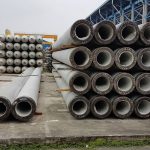Liga Asuransi – Tuesday, September 23, 2025, marked a significant day in the economic relationship between Indonesia and the European Union. Both parties officially agreed on substantive conclusions regarding…Comprehensive Economic Partnership Agreement (CEPA) between Indonesia and the European Union. Under the agreement, approximately 80 percent of Indonesian products exported to the European Union will be tariff-free initially, with tariff elimination of up to 98 percent over the long term.
This agreement is the culmination of a long negotiation process since Indonesia and the European Union began CEPA talks. The idea of closer, more comprehensive trade cooperation has its roots in discourse since 2009, with the formation ofIIndonesia – EU Vision Group, which then push for a broader trade talks agenda than just an FTA: including services, investment, regulation and capacity building. Official negotiations only began around 2016, and through various rounds of intensive talks in many sectors until almost a decade later the process reached a point.“substantive conclusion”.
Why is Indonesia so ambitious about realizing the CEPA? Because this agreement is seen as opening the door for penetration into the European Union market—which has been riddled with tariff and non-tariff barriers—for superior Indonesian products such as palm oil, textiles, clothing, and fishery products.In addition, investment access from European companies to strategic sectors (such as technology, renewable energy) and regulatory harmonization will increase Indonesia’s competitiveness in the global arena.
In the context of the domestic insurance industry, finalizationCEPAopens a new chapter that cannot be ignored. With increasingly open market access, increasing investment flows, and increasingly complex cross-border protection needs, the Indonesian insurance industry needs to prepare to seize opportunities and face new challenges. This article will examine in depth how the finalization of the CEPA will impact the national insurance industry—from opportunities for export-import insurance products, competition with foreign insurers, to regulatory adaptations and product innovations that must be implemented to remain relevant and competitive amidst global integration.
EU–Indonesia CEPA Overview
- Scope of the Agreement
The Indonesia–EU CEPA is more than just a free trade agreement. It encompasses trade in goods, services, investment, intellectual property rights, environmental standards, and capacity building. Its primary goal is to create a more comprehensive framework for balanced, sustainable, and competitive economic relations. - Impact of Tariffs and Market Access
This agreement will eliminate tariffs on approximately 80% of Indonesian products entering the European Union market, with a projected increase to 98% over time. The main sectors benefiting are:
- Palm oil: while still facing sustainability issues, market access is clearer.
- Textiles and clothing: export potential is increasing rapidly because the European Union is a premium market.
- Fishery and agricultural products: low rates encourage competitiveness.
- Investment and Regulation
The CEPA also regulates investment protection. The European Union is committed to providing legal certainty for its investors in Indonesia, while Indonesia gains access to technology and capital. Harmonization of standards, including those on the environment and sustainability, is a crucial issue requiring adaptation of domestic regulations. - Economic Significance
According to a European Commission analysis, the CEPA could increase Indonesian exports to the European Union by billions of euros annually. For the EU, Indonesia’s large and dynamic market offers an opportunity to diversify its supply chain in Southeast Asia, especially amidst global trade rivalries. - Implications for Other Industries
The logistics, financial services, and insurance sectors are expected to be boosted by increasing trade and investment volumes. Demand for cross-border transaction protection, investment guarantees, and environmental insurance will increase as new trade relationships become more complex.
Economic Impact of CEPA Finalization on the Domestic Sector
The finalization of the EU–Indonesia CEPA will not only impact trade figures or the export-import balance. It will also impact the domestic economy, impact industrial competitiveness, and demand regulatory and infrastructure readiness within the country. Here are some of the key impacts:
- Increasing National Export Competitiveness
With the elimination of tariffs on up to 98% of products, domestic industries have a significant opportunity to penetrate the premium European market. Superior products such as sustainable palm oil, coffee, spices, textiles, footwear, and fisheries will have easier access. This will encourage increased production capacity, investment in machinery, and improvement in human resource quality in related sectors. - Pressure on Less Competitive Industries
CEPAOpening the door not only to exports but also to imports. Manufacturing products, automotive products, and even pharmaceuticals from Europe will have easier access to Indonesia. Domestic industries unprepared for quality and price competition risk being eroded. The government and businesses must prepare adaptation strategies to move beyond mere markets. - Foreign Investment Inflow
Legal certainty and more transparent regulations will attract European investors to Indonesia. Renewable energy, environmentally friendly technologies, and value-added manufacturing are predicted to be key targets. This offers opportunities for technology transfer and job creation, while also encouraging higher business standards. - Push for Sustainability Regulation
The European Union emphasizes environmental and sustainability issues in every trade agreement. Finalizing the CEPA will require Indonesia to improve environmentally friendly production standards, across plantations, manufacturing, and the extractive industry. For businesses, this means additional investment is required to meet international certification requirements. - Impact on the Domestic Services Sector
Not only the real sector, but also domestic services such as logistics, transportation, information technology, and finance will be boosted by increased trade activity. Goods distribution systems will need to be more efficient, while financial services—including insurance—will play a crucial role in ensuring the smooth flow of cross-border transactions. - Challenges for MSMEs
MSMEs have the potential to gain new markets, but they also face the challenge of higher quality standards and certification. The government needs to provide policy support, access to financing, and market education to enable MSMEs to capitalize on CEPA opportunities.
Opportunities and Challenges for the National Insurance Industry
The insurance industry is one of the sectors that will be significantly impacted by the finalization of the EU–Indonesia CEPA. Given the intensification of trade, investment, and the flow of goods and services, the need for risk protection will also increase. However, this significant opportunity also comes with challenges that require national insurance companies to be prepared.
- Increasing Demand for Trade Insurance and Export Credit
With increasing exports to the European Union, businesses need protection against credit risk and distribution disruptions. Products such asTrade Credit Insurance And Marine Cargo Insurance will become increasingly relevant. Domestic insurance must be able to provide competitive services supported by global reinsurance capacity. - Environmental and Sustainability Insurance
As the European Union emphasizes environmentally friendly standards, Indonesian companies exporting goods there could face the risk of claims for violations of emissions standards, pollution, or unsustainable practices. This opens up opportunities forEnvironmental Liability Insuranceand sustainability-related protection products. - Investment and Infrastructure Protection
The influx of foreign investment from Europe will generate demand for insurance for infrastructure, energy, and manufacturing projects.Engineering, Construction All Risk (CAR), Erection All Risk (EAR), as well as Political Risk Insurance became an important instrument in securing long-term investments. - Competition with Global Insurance Companies
The CEPA allows European insurance and reinsurance companies broader access to the Indonesian market. This means the domestic industry will face intense competition in terms of products, technology, and services. National companies must improve their underwriting capacity, product innovation, and operational efficiency to remain relevant. - Opportunities for Collaboration and Technology Transfer
On the other hand, the presence of global companies also opens up opportunities for collaboration. Reinsurance collaboration, risk data exchange, and the adoption of digital technology in underwriting and claims can accelerate the modernization of the national insurance industry. - Regulatory Challenges and Market Literacy
The Financial Services Authority (OJK) needs to strengthen regulations to ensure healthy competition among domestic insurance products while protecting consumer interests. Furthermore, insurance literacy among Indonesian businesses, particularly MSMEs, must be improved so they can utilize insurance protection as part of their export strategy.
National Insurance Industry Adaptation Strategy and the Crucial Role of Brokers
The finalization of the EU–Indonesia CEPA presents both significant opportunities and complex challenges for the national insurance industry. Under these conditions,the role of insurance brokers becomes very crucial, because they are not just connectors, but strategic consultants who help business actors understand, manage, and protect themselves from new risks.
- Becoming a Navigator Amidst Complex Risks
The CEPA brings complex new trade, investment, and regulatory flows. Insurance brokers act as navigators, able to map the specific risks of each sector, from goods exports and energy investments to environmental sustainability. Without this role, many businesses could make missteps in selecting coverage. - Designing Targeted Protection Solutions
Every industry faces different risks. Brokers ensure companies don’t purchase irrelevant standard protection, but instead get the right coverage tailor-made insurance solution that meet needs. In the CEPA era, this flexibility determines whether businesses can operate safely in the global market. - Connecting Indonesia with Global Capacity
The entry of European companies brings higher risk standards. Insurance brokers provide a gateway for Indonesian businesses to connect with global reinsurance, international networks, and global best practices. This is what keeps the national industry competitive on the global stage. - Irreplaceable Educational Role
Many MSMEs and domestic corporations still don’t realize the seriousness of the risks in international trade. Insurance brokers act as market educators, increasing risk protection literacy, and encouraging insurance to be viewed not simply as a cost, but as a value.strategic instruments to maintain business continuity. - Assistance in Crisis Situations
When it comes to international claims, the process is often complicated. Brokers act as advocates, advocating for clients’ rights, and ensuring claims are resolved fairly and efficiently. Without brokers, many companies could experience significant losses in time and money.
In other words, in the CEPA era,Insurance brokers are strategic partners that cannot be ignoredThey are at the forefront of ensuring that Indonesian companies are prepared to face the opportunities and challenges of free trade with appropriate, robust, and sustainable protection.
Conclusion
The finalization of the EU–Indonesia CEPA marks a significant milestone in the history of national trade. It opens up vast market opportunities with greater export access, increasing foreign investment flows, and technology transfer from the European Union. However, these opportunities pose significant challenges: stringent sustainability standards, competition from high-quality imported products, and increasingly complex cross-border trade and investment risks.
Here it is the role of insurance protection and insurance brokers becomes very crucialDomestic industries, both large-scale and MSMEs, cannot rely solely on production and marketing strategies. They must also ensure proper risk protection to protect their businesses from being shaken by legal issues, international claims, or failed transactions.
Insurance brokers such asL&G Insurance Brokers present not just as an intermediary, but as strategic partners who understand business risks in the era of free trade. With extensive experience, a global network, and a deep understanding of domestic industries, L&G is able to help businesses design targeted, competitive protection solutions tailored to the specific needs of each sector.
📞 Contact L&G Insurance Brokers at 0811-850-7773
Get comprehensive risk consulting and insurance solutions to ensure your business is ready to capitalize on the significant opportunities presented by CEPA, while being protected from unforeseen global challenges.














